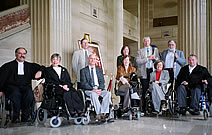Act Now

Empower U: Learn to Access Your Disability Rights Training on Canadian Human Rights, the Convention on the Rights of Persons with Disabilities (CRPD) and its Optional Protocol (OP) training aims to increase awareness of how to address discrimination using more familiar Canadian human rights laws such as Human Rights Codes and the newer international Convention on the Rights of Persons with Disabilities (CRPD). This is training for persons with disabilities by persons with disabilities. The training is part of a project funded by Employment and Social Development Canada and implemented by the Council of Canadians with Disabilities (CCD) in collaboration with Canadian Multicultural Disability Centre Inc. (CMDCI), Citizens With Disabilities – Ontario (CWDO), Manitoba League of Persons with Disabilities (MLPD) and National Educational Association of Disabled Students (NEADS). Read more.
Sign Up for our monthly digest
A monthly newsletter from CCD about what is happening in the community
CCD Says Regulations Are Necessary to Increase the Accessibility of Passenger Transportation
Related Documents
October 12, 2023
Travelling to the North to Gather Information towards Developing CTA Accessibility Regulations for Small Carriers and Terminals Not Covered by the Accessible Transportation for People with Disabilities Regulation (ATPDR)
March 15, 2018
Bill C-49 Empowers Goliath and Takes Away David's Sling Shot
March 14, 2018
Transportation Modernization Act (Bill C-49)
Media Release
FOR IMMEDIATE RELEASE
On Thursday, November 17, 2016 in Montreal, Bob Brown, Co-Chair of CCD's Transportation Committee, will attend the federal government's roundtable discussion on planned accessibility legislation, as it relates to transportation. The federal government regulates air, rail, interprovincial marine and bus transportation. Roundtable organizers want participants to identify gaps in the legal and policy environment and to suggest ways for Canada to make transportation more accessible. Among other recommendations, CCD will urge the adoption of comprehensive accessibility regulations.
In the 1990s, when Canada turned its back on binding accessibility regulations in favour of voluntary codes of practice to prevent barriers, progress in Canada toward a fully accessible transportation system became lamentably slow. The burden to remedy transportation barriers through litigation fell on people with disabilities and their organizations, such as CCD.
CCD has firsthand experience with how carriers are ignoring voluntary codes. In 2000, VIA Rail purchased and attempted to put into service inaccessible passenger rail cars, which violated the standards of the voluntary rail code. The cars purchased by VIA had been rejected by other countries that had accessibility regulations. Travelers using wheelchairs would have essentially been segregated in a sleeper compartment on the lounge car. With great risk to its continued viability, CCD went to court to challenge this violation of the human rights of travelers with disabilities. The Supreme Court of Canada sided with CCD.
"A country that is committed to human rights and accessibility does not leave it to community organizations to police the transportation industry in order to prevent carriers from violating the mobility rights of people with disabilities," states Bob Brown, Co-Chair of the CCD Transportation Committee, who will be present at the Roundtable.
Relatedly, CCD will also call for the strengthening of the Canadian Transportation Agency (CTA), which regulates the transportation system and protects the human rights of persons with disabilities to an accessible transportation network. For example, Canada could empower the CTA to take proactive actions to remedy barriers without a complaint first coming from a traveler with a disability. This would lead to greater system-wide change.
Another area that will be addressed concerns the federal government using its spending power to promote accessibility and universal design. To ensure that accessibility becomes a priority, CCD will urge the Federal Government to attach universal design requirements to all infrastructure spending, procurement activities and subsidies to industry.
The Council of Canadians with Disabilities (CCD) is a national organization of people with disabilities working for an inclusive and accessible Canada.
-30-
For more information contact:
Bob Brown, Co-Chair, CCD Transportation Committee: bob.brown.001@hotmail.com
Pat Danforth, Co-Chair CCD Transportation Committee: pidanforth@shaw.ca
James Hicks, CCD National Coordinator: james@ccdonline.ca

CCD wins VIA Rail case at the Supreme Court of Canada on March 23, 2007.
